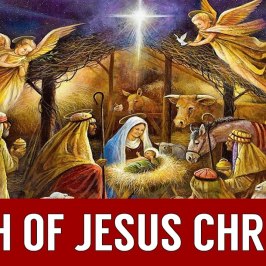CENTRAL THOUGHT The Believers’ victorious living on earth is a foretaste of the glorious life hereafter. HYMN: THERE’S A LAND THAT IS FAIRER THAN DAY TEXT: 2 Samuel 12: 15-23; Philippians 1:21-23; 1 Corinthians 15:42-44 INTRODUCTION: “…for what is your life? It is even a vapor, that appeared for a little time, and then vanished away”, James 4:14. The physical life of man is brief. However, death is a universal experience for all of mankind. There’s no individual, whether rich or poor, wise or foolish, great or small that has power to resist in the day of death. Psalm 89:48 says, “What man is he that lived and shall not see death? Shall he deliver his soul from the hand of the grave?” The appointment with death is compulsory for both the believer in Christ and the non-believers in Him. The Lord Jesus conquered death for the believers and defeated Satan that had enslaved mankind in the fear of death. To the believer death is gain, triumphant, and to be greatly desired. The believer in Christ does not fear death, Psalm 23:4, but has hope in his death, Proverbs 14:32. Whether alive or dead physically, the believer belongs to the Lord, and lives eternally with the Lord....
Learn MoreCENTRAL THOUGHT: The promise of the LORD’s birth was made and fulfilled by God Himself. HYMN: OH, COME ALL YE FAITHFUL TEXT: Luke 2:1-20 INTRODUCTION: The birth of the LORD Jesus Christ is generally celebrated all over the world. Most countries have set aside December 25th of every year as the day to commemorate His birth. In many countries (especially in the western world, that day is observed as a public holiday. Usually commemoration of the LORD’s birth christened Christmas is done by most people (and sometimes countries) with pomp and pageantry. Homes, streets, shops, etc. are decorated. In the business world, it is also a time of boom. More goods are brought into the market and sales increase. Because of the upsurge in business activities during the period, some critics say that the Christmas celebration has been or is being commercialized. Nevertheless, the fact of the LORD’s birth is a reality. It is fact of the holy scriptures and also a fact of human historical records and writings. The events surrounding His birth were also real. Therefore, while there is joy in celebrating the birth of the LORD, the significance or purpose of that birth must not be ignored. He was born, lived, died, rose again and is...
Learn MoreCENTRAL THOUGHT: Thanksgiving is an expression of gratitude to God for all His benefits. TEXT: Psalm 103:1-6, Thessalonians 5:18 INTRODUCTION Simply put, thanksgiving is an expression of gratitude or gratefulness to someone especially to God. People have always given and continue to give thanks to God for whom He is and will continue to be. The first thanksgiving recorded in scriptures was that of Cain and Abel but God rejected Cain’s. We are however, not told why God rejected Cain’s offering, but God who knows all secrets and saw something that displeased Him about Cain and his offering. He is not interested in our offerings alone, but in the totality of our being. He is interested in our motive or sincerity in whatever we do, even in thanksgiving. The scriptures enjoin us to give thanks always. However, most congregations have adopted the practice of setting aside one day or more in the year in which their members and in most cases even non-members are expected to thank God apart from the daily expression of thanksgiving to God by the individual. Like the Psalmist says, it is a good thing to thank the Lord, but the worrisome thing about thanksgiving is the way it is done among some today. LESSON...
Learn MoreCENTRAL THOUGHT The absence of Natural Affection is indicative of a decaying society awaiting God’s judgement. TEXT: 2 Timothy 3:1-3; Romans 12:9-12 INTRODUCTION One of the features of the end-time that is gaining prominence both in the world and amongst Christians is the issue of indifference to the plight of others. Simply put, the vice of “neighborliness” is far replacing the virtue of “neighborliness” as taught by the Lord Jesus Christ, Luke 10:29-37. The center point of the gospel is love…. “For God so loved the world (of sinners) that He gave his only begotten son…”, John 3:16. Concerns for mankind, demonstration of compassion and the provision of relief to those in distress characterized the ministry of our Lord Jesus Christ. Since man is the only creature that God made after His very image and likeness, He expects that the activities of every Christian should revolve around the love of God expressed to man. We therefore cannot love God if we hate the man (or our neighbor) that was created after His image and likeness, 1 John 4:21. End-time events show that most men and women are getting less concerned about the plight of their fellow human beings, be they Christians or unbelievers. Nothing is big, valuable,...
Learn MoreCENTRAL THOUGHT All forms of unholy living will attract God’s judgement. TEXT: 2 Timothy 3:2 INTRODUCTION A closer look at the events in our society today will reveal how the devil is mounting pressure on people to lower moral standards and holy living so as to distance them from God. The worrisome aspect of the growth of sinful living is that Satan’s deception is not restricted to the unbelieving larger society alone. Some churches and their leaders are getting increasingly infested by this “end time bug” of “it doesn’t matter” mentality, which condones and compromises unholy, sinful, lifestyles. It is indeed increasingly becoming difficult to distinguish some Christians from unbelievers as a result of similarities in their lifestyles. The aim of Satan in this regard is very clear. He knows fully well that this time (reign), is running out and that the second coming of Christ is closer than ever. Satan would therefore want to keep people from meeting God’s standards through unholy living, and for believers, he would work relentlessly to de-emphasize the place and importance of holiness. However, holiness remains and all-time standard that God demands of his children as a condition for pleasing Him and for gaining access to His kingdom, 1...
Learn MoreCENTRAL THOUGHT May it not be that someone else does what the Lord has assigned for you because of your failure and wickedness. TEXT: Matthew 21: 33-44, Romans 9:3-5, 25-33 READING TEXT: Matthew 21: 33-44 INTRODUCTION: Parables, which were common – place stories, provided our Lord Jesus Christ an effective vehicle of communicating the deep truths of the kingdom of God. This particular one of the Householder and husbandmen was no exception. It reveals God’s eternal plan of salvation for mankind, namely that through Israel the Gospel of Christ be made known to the world. With their reflection of the Messiah, the gentiles – a people who were not regarded as one – have, by faith, become children of Abraham and instruments for the propagation of the Gospel. This parable could be of more significance to our generation than it was to the audience (scribes, Pharisees, commoners, etc.) that received it from the Lord. Israel got carries away with her rich religious heritage, thinking it could substitute for the Messiah. That same deception has overtaken some of us today. We think the kingdom of God is our exclusive right because of either our position in church or our financial contribution to the church, or...
Learn More




